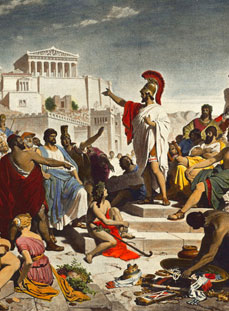
The nature of Democracy in Athens
Even though Athens was a democracy, ancient athletics were not necessarily democratic in nature. Because athletic prowess required leisure time for training and expenditures for instruction, athletes usually came from the aristocratic classes. This would have been even more true with regard to equestrian events, as the cost of owning horses was otherwise prohibitive.
Women were excluded from most areas of public life, religious activities being the exception. Although they may not have watched their sons and husbands compete, they played a prominent role in the Panathenaic procession and wove the peplos for the goddess. As for slaves, who constituted about 30 percent of the population of ancient Athens, they did not customarily compete in the games but they may have served as jockeys and charioteers.
In antiquity, Athens prided itself on being "open to the world"; by encouraging the participation of outsiders, Athenians enhanced the fame of their own games and those of Greece in general. The same is true today.
